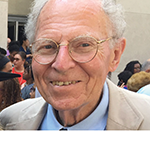Three years later, Donath and Landsteiner identified, studied and understood an autoimmune disease for the first time. The field seemed to be off and running, with autoimmunity sought and found in diseases of the brain, eyes, testicles, thyroid and other organs in the decade before the World War I.
Then, due to circumstances outside the scientific community associated with the war, a “dark age” in autoimmunity research settled in.
Eventually, though, the focus on immunology shifted to a focus on immunochemistry.
Throughout his presentation, Dr. Plotz fired off prominent names throughout autoimmunity history.
“Why am I telling you all these names?” Dr. Plotz asked. “These were all people I knew.” In other words, he said, the researchers sitting in front of him could later be the names being invoked in a speech like the one he was giving.
“It’s our chance at a brush with immortality,” Dr. Plotz said.
Dr. Plotz then turned his attention to the modern era of diseases and to the role of the microbiome. It turns out, he said, that things like improved hygiene and better water purification have probably contributed to the emergence of new diseases, because they disrupted the microbiome to which humans had grown accustomed.
“It’s been postulated that these creatures had been stimulating our T-reg cells,” he said. “And now the immune system was hunting for new targets, and these new diseases were discovered.”
It’s been found that there’s a lower incidence of asthma and eczema in children raised on farms and whose parents didn’t sterilize their pacifiers. At times of polio outbreaks, children who were kept out of public swimming pools by their parents actually ended up getting the disease more often than those allowed to swim in public pools.
Dr. Plotz said he doesn’t have a “religious” view of the human microbiome, but his remarks on the subject do reflect at least a profound appreciation for its role.
The microbiome might be best termed “commensals,” a word derived from Latin that roughly means to eat from the same table.
“They are an intimate part of us in fascinating and complex ways you have surely begun to hear about,” he said.
“The realization that we cannot separate our existence from the microbial world that coats our surfaces, that we depend on those commensals and recognize that many aspects of our lives are influenced by them—and that those commensals also depend on us—this is a huge idea and has the possibility of profoundly altering our exceptionalist view and narcissistic isolation as a species.”

